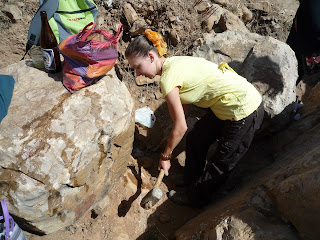 This is not forced labor, but a religious-spiritual ritual to honor the Virgen and the Pachamama, and to bless one's family with wealth throughout the year. The concept is quite basic: Take a hammer, clobber stones, get them blessed by a priest and carry them home. Keep them until the next year, then bring them back to the temple and clobber new stones! Needless to say, I wasnt very successful in my attempts to get stones out of this big rock, but my host family let me have two little pieces of their stones :) In Bolivia, religion and ancestral indigenous traditions are closely intertwined, and some historians say, this is the part where the 'conquista' of the Spaniards has been incomplete: The Roman Catholic Church, although it tried extremely hard, could never completely eradicate the indigenous cultural heritage of the people in South America. This has led to a "mezcla" in beliefs and traditions, which forms today part of the cultural richness of Bolivia.
This is not forced labor, but a religious-spiritual ritual to honor the Virgen and the Pachamama, and to bless one's family with wealth throughout the year. The concept is quite basic: Take a hammer, clobber stones, get them blessed by a priest and carry them home. Keep them until the next year, then bring them back to the temple and clobber new stones! Needless to say, I wasnt very successful in my attempts to get stones out of this big rock, but my host family let me have two little pieces of their stones :) In Bolivia, religion and ancestral indigenous traditions are closely intertwined, and some historians say, this is the part where the 'conquista' of the Spaniards has been incomplete: The Roman Catholic Church, although it tried extremely hard, could never completely eradicate the indigenous cultural heritage of the people in South America. This has led to a "mezcla" in beliefs and traditions, which forms today part of the cultural richness of Bolivia. I forgot to mention: Alcohol, particularly Beer, is such an important part of daily life and traditions in Bolivia that it even has religious value for the Urkupina ceremony: Before you start clobbering the stones, you have to verse a more or less little quantity of alcohol on the stones, to thank the Pachamama (Mother Earth) for the fruits she bears. Then you have to drink yourself, and then you can start the actual ceremony. This, btw, is el Doctor Jorge Arébalo, or 'papito', my host dad :)
I forgot to mention: Alcohol, particularly Beer, is such an important part of daily life and traditions in Bolivia that it even has religious value for the Urkupina ceremony: Before you start clobbering the stones, you have to verse a more or less little quantity of alcohol on the stones, to thank the Pachamama (Mother Earth) for the fruits she bears. Then you have to drink yourself, and then you can start the actual ceremony. This, btw, is el Doctor Jorge Arébalo, or 'papito', my host dad :)
An indigenous woman, called "Cholita", with her child. The skirt she is wearing is called "chola", and is fashioned according to the skirts the Spanish conquistadores forced the indigenous women to wear when they arrived in South America. Today it is widely common and available in a thousand different colors and variations.
 Indigenous children in traditional clothing. Indigenous people believe that each picture steals a part of their soul, so I did not take too many. In Bolivia, only married couples can adopt children, so in order for my future family planning to work out, I will either have to find a husband that shares my dreams, or adopt in Colombia, where single women can legally adopt in selected orphanages.
Indigenous children in traditional clothing. Indigenous people believe that each picture steals a part of their soul, so I did not take too many. In Bolivia, only married couples can adopt children, so in order for my future family planning to work out, I will either have to find a husband that shares my dreams, or adopt in Colombia, where single women can legally adopt in selected orphanages.
Hey, dieses Teil in Deiner Hand sieht aus wie ein Vorschlaghammer *lach*... hast Du den überhaupt in die Höhe gebracht??? :-) Toller Reisebericht bisher.. so nebenbei bemerkt! Papa möchte seinen Lebensabend in Cochabamba verbringen, um dort noch für den Rest seines Lebens Gutes zu tun. Wenn Du dort lange genug bleibst, komme ich Dich vielleicht besuchen :-)
ReplyDeleteBussiiiii, Maam